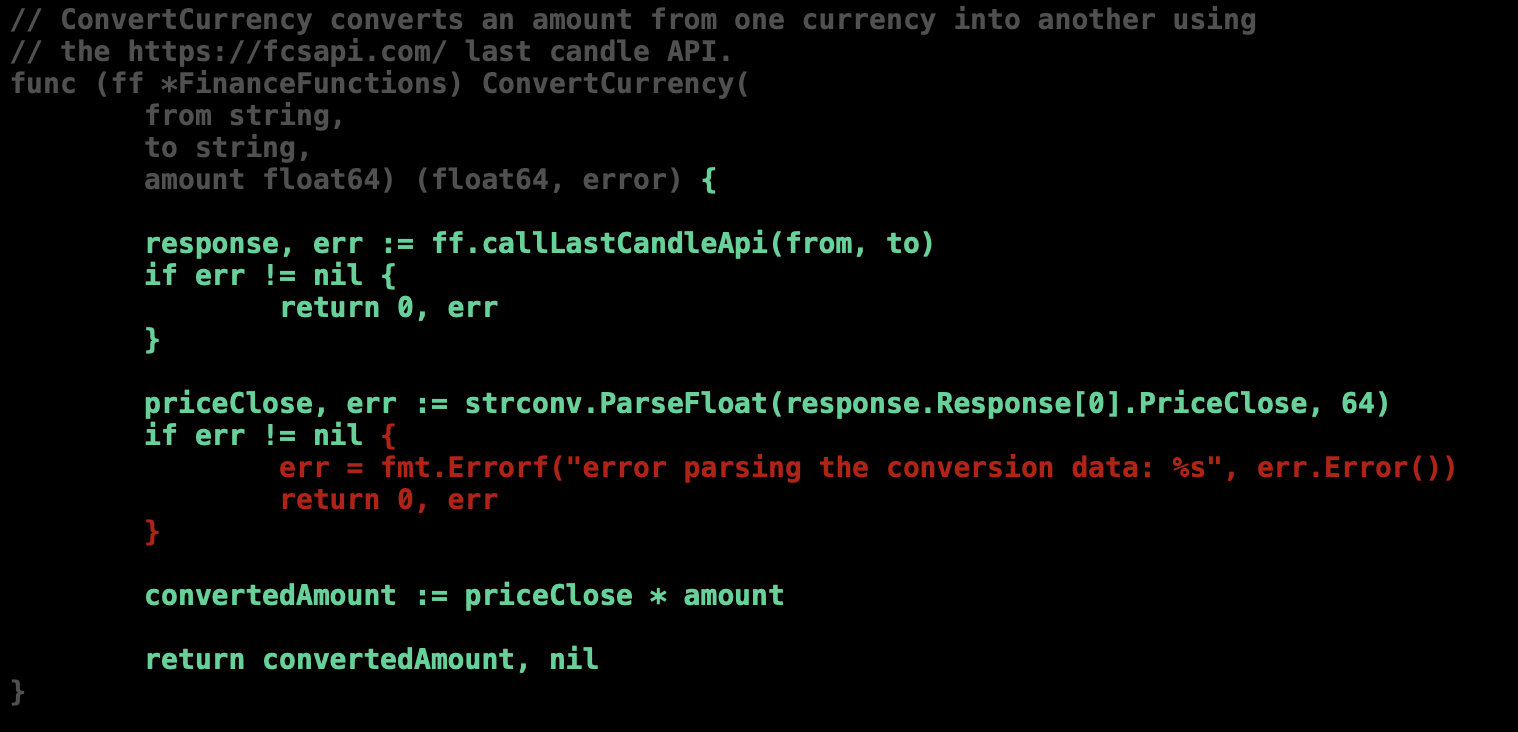Increase coverage in the Lib
If you run the test coverage like explained in the last section, you'll see a very low number of test code coverage for the library.
ok github.com/renato0307/learning-go-lib/finance 0.830s coverage: 61.4% of statements
ok github.com/renato0307/learning-go-lib/programming 0.667s coverage: 35.5% of statements
Checking the report we conclude the cause is the mock interface that are being generated automatically and we don't have tests for them.
We would like to exclude them. As that is not possible when running the
go test command, we can move them to a separated folder:
mkdir -p finance/mock
mkdir -p programming/mock
mv finance/mock_interface.go finance/mock
mv programming/mock_interface.go programming/mock
If we run the test command again we get better numbers:
go test ./... -cover
The result is much better:
ok github.com/renato0307/learning-go-lib/finance 0.566s coverage: 79.4% of statements
? github.com/renato0307/learning-go-lib/finance/mock [no test files]
ok github.com/renato0307/learning-go-lib/programming 0.387s coverage: 100.0% of statements
? github.com/renato0307/learning-go-lib/programming/mock [no test files]
In need to take a look into the finance package to understand were we can
increase the test code coverage.
By running the tests and the generating the report:
go test ./... -coverprofile=coverage.out && go tool cover -html=coverage.out
We can see that we are missing tests for some error handling blocks.
Let's tackle one by one:

We need to add test where the value used for the currency conversion is not a float:
func TestConvertCurrencyWithInvalidPriceClose(t *testing.T) {
// arrange
expected := // the "c" value is not a float
`
{
"code": 200,
"info": {
"_t": "2021-12-27 21:49:18 UTC",
"credit_count": 1,
"server_time": "2021-12-27 21:49:18 UTC"
},
"msg": "Successfully",
"response": [
{
"c": "i'm not a float",
"ch": "-0.00013",
"cp": "-0.01%",
"h": "1.13281",
"id": "1",
"l": "1.13246",
"o": "1.13281",
"s": "EUR/USD",
"t": "1640638800",
"tm": "2021-12-27 21:00:00",
"up": "2021-12-27 21:49:10"
}
],
"status": true
}
`
svr := httptest.NewServer(http.HandlerFunc(func(w http.ResponseWriter, r *http.Request) {
fmt.Fprint(w, expected)
}))
defer svr.Close()
ff := NewFinanceFunctions(svr.URL, "DummyApiKey")
// act
_, err := ff.ConvertCurrency("EUR", "USD", 10)
// assert
assert.NotNil(t, err)
assert.Contains(t, err.Error(), "error parsing the conversion data")
}
By running the test coverage command again we get an increase to 85.3%:
github.com/renato0307/learning-go-lib/finance 0.206s coverage: 85.3% of statements
Let's check other error handling blocks and add tests for them:
func TestConvertCurrencyWithInvalidProtocolUrl(t *testing.T) {
// arrange
invalidFcsapiUrl := "xxxx://someurl"
ff := NewFinanceFunctions(invalidFcsapiUrl, "DummyApiKey")
// act
result, err := ff.ConvertCurrency("EUR", "USD", 10)
// assert
assert.NotNil(t, err)
assert.Contains(t, err.Error(), "unsupported protocol scheme")
assert.Equal(t, 0.0, result)
}
func TestConvertCurrencyWithUrlVarReplacement(t *testing.T) {
// arrange
invalidFcsapiUrl := "https://fcsapi.com/api-v3/forex/candle?symbol=%s/%s&period=1h&access_key=%s"
ff := NewFinanceFunctions(invalidFcsapiUrl, "DummyApiKey")
// act
result, err := ff.ConvertCurrency("EUR", "USD", 10)
// assert
assert.NotNil(t, err)
assert.NotContains(t, err.Error(), "%s")
assert.Equal(t, 0.0, result)
}
Running the tests again results in more than 90% of coverage:
ok github.com/renato0307/learning-go-lib/finance 0.916s coverage: 94.6% of statements
The last error block is harder to tackle and it will require a small code refactoring.
// ...
body, err := ioutil.ReadAll(httpResponse.Body)
if err != nil {
err = fmt.Errorf("error reading the conversion data: %s", err.Error())
return response, err
}
// ...
We first will extract this code to a function so we can test it isolated:
// ...
body, err := readBody(httpResponse.Body)
if err != nil {
return response, err
}
// ...
Where readBody is:
func readBody(bodyReader io.ReadCloser) ([]byte, error) {
defer bodyReader.Close()
body, err := ioutil.ReadAll(bodyReader)
if err != nil {
return []byte{}, fmt.Errorf("error reading the conversion data: %s", err.Error())
}
return body, nil
}
To test this change we need to pass to the readBody function a fake
ReaderCloser, which always returns an error:
type errReader int
func (errReader) Read(p []byte) (n int, err error) {
return 0, errors.New("test error")
}
func (errReader) Close() error {
return nil
}
The test code is:
func TestReadBody(t *testing.T) {
// arrange
bodyReader := errReader(0)
// act
body, err := readBody(bodyReader)
// assert
assert.Error(t, err)
assert.Empty(t, body)
}
Running the tests again we get 97.5% of code coverage which is good enough:
ok github.com/renato0307/learning-go-lib/finance 0.737s coverage: 97.5% of statements
Wrap up
Commit, push and create a new tag:
git add .
git commit -m "refactor: move mocks to a separate folder" -m "test: increase coverage"
git push
git tag -a v0.0.5 -m "v0.0.5"
git push origin v0.0.5
Next
The next section is Increase coverage in the API.